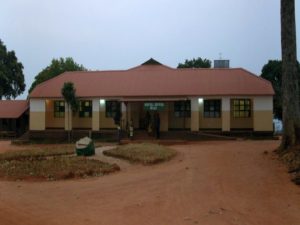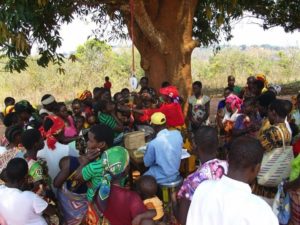By Nathaniel Luce

Pictured: Zambezia Province of Mozambique. Credit: Troy Moon.
When it comes to providing 21st-century health care to patients—even to patients who desperately need it—the “if you build it, they will come” model doesn’t hold up for impoverished regions, according to a Vanderbilt University study.
The study looked at how residents of a poor region of Mozambique are choosing what kind of medical care they want. Due to a slew of new facilities, they can now choose between visiting a traditional healer or a doctor.
“It’s not enough to just make modern health care available; you must also find a way to get people to use it,” says Bruce Cooil, the Richmond Professor of Management at the Vanderbilt University Owen Graduate School of Management and one of three authors on the study, which was published recently in the journal Social Science & Medicine.
And in fact, a great deal of money and effort has gone into trying to convince people to choose newly available biomedical facilities over traditional medicine, says study co-author Bart Victor, Cal Turner Professor of Moral Leadership at the Owen School.
Yet, despite the vast resources poured into such efforts, little data existed on what, precisely, was driving patient choice. So Victor and Cooil, along with Abraham Mukolo, of Vanderbilt University’s Institute for Global Health, set out to find out.
The authors used data gathered in a 2010 survey of female heads of households across Mozambique’s rural Zambezia province, one of the poorest areas in one of the world’s poorest countries.
“It’s a very unique data set,” Cooil says. The sample was random, and large—the study developed models based on 1,045 respondents. More than 99 percent of those approached agreed to take part.

Pictured: A medical care facility in Mozambique. Credit: Troy Moon.
Mozambique, which gained independence from Portugal in 1975, has suffered through crisis after crisis. The southeastern African country, with more than 1,500 miles of coastline along the Indian Ocean, has been ravaged by a prolonged civil war, drought, and a pandemic of HIV/AIDS. According to 2013 numbers, the disease afflicts more than 10 percent of citizens; in portions of Zambezia, the numbers climb to more than 20 percent, Victor said. Life expectancy is just shy of 53 years of age.
To confront such daunting and widespread problems, there has been an unprecedented effort to improve Mozambique’s public health infrastructure in recent years.
“It is the largest public health intervention in the history of the world, any way you measure it,” Victor says. Vanderbilt alone has set up 40 HIV/AIDS clinics in the Zambezia province; USAID (United States Agency for International Development) and several NGOs have provided many more.
It is widely accepted, both Cooil and Victor say, that three main factors drive whether patients choose modern over traditional medicine: their level of sophistication and connection to the modern world (in other words, how cosmopolitan they are), their general level of biomedical knowledge (their understanding of the purpose of vaccinations, for example) and the quality of their experience with modern medicine (including overall satisfaction and whether their condition improved).
The Owen School study shows that this last variable—essentially, the quality of their experience—is by far the most important in driving patients to use modern medical care exclusively.

Pictured: Residents of Mozambique. Credit: Troy Moon.
Victor says that, in light of this data, it’s important to reexamine how resources are allocated.
“We’re able to say that none of these are bad ideas—integration, community building, education efforts—but they’re not the most potent, direct drivers of health care choice. So let’s focus on both the measurement of the quality of the patient experience and efforts to enhance the quality of the patient experience.”
“Clearly the best policy when it comes to providing modern health care is to make sure you are satisfying your customers,” Cooil said. “It helps if they’re a little more sophisticated, a little more educated, that they’re not in extreme poverty; but it’s primarily a function of their experience.
“It’s a perfect laboratory for exploring what goes on with extreme poverty and how we can make a difference,” Cooil added. “It would be great if just sharing modern medical resources were enough. But it’s not.”
This research was supported in part by the Dean’s fund for Faculty Research, Vanderbilt University Owen Graduate School of Management. The parent study (SCIP) was funded by the United States Agency for International Development (USAID) – Mozambique (Award No. 656-A-00-09-00141 -00), via a sub-grant from World Vision Inc. The content is solely the responsibility of the authors and does not necessarily represent the official views of any supporting agencies.
CITATION: Mukolo, A., Cooil, B., and Victor, B. “The Effects of Utility Evaluations, Biomedical Knowledge and Modernization on Intention to Exclusively Use Biomedical Health Facilities among Rural Households in Mozambique,” (Social Science & Medicine, 2015). http://dx.doi.org/10.1016/j.socscimed.2015.06.013
Writer: Andrea Mustain
Contact Person: Brett Israel Director, Business News and Communications Vanderbilt University Owen Graduate School of Management
Contact Phone: (615) 322-3469
Contact Email: brett.israel@owen.vanderbilt.edu